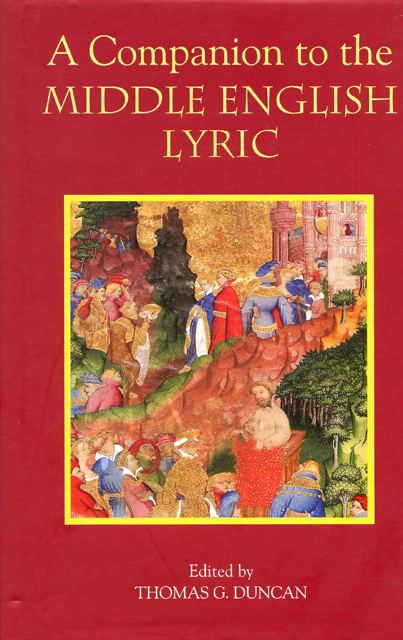Book contents
- Frontmatter
- Contents
- Acknowledgements
- Abbreviations
- Editorial Note
- Introduction
- 1 Middle English Lyrics and Manuscripts
- 2 Middle English Lyrics: Metre and Editorial Practice
- 3 The Love Lyric before Chaucer
- 4 Moral and Penitential Lyrics
- 5 Middle English Religious Lyrics
- 6 Middle English Courtly Lyrics: Chaucer to Henry VIII
- 7 The Middle English Carol
- 8 Political Lyrics
- 9 The Lyric in the Sermon
- 10 ‘Cuius Contrarium’: Middle English Popular Lyrics
- 11 Gender and Voice in Middle English Religious Lyrics
- 12 Lyrics in Middle Scots
- Bibliography of works cited
- Index of Manuscripts Cited
- General Index
- Index of Lyrics
1 - Middle English Lyrics and Manuscripts
Published online by Cambridge University Press: 23 March 2023
- Frontmatter
- Contents
- Acknowledgements
- Abbreviations
- Editorial Note
- Introduction
- 1 Middle English Lyrics and Manuscripts
- 2 Middle English Lyrics: Metre and Editorial Practice
- 3 The Love Lyric before Chaucer
- 4 Moral and Penitential Lyrics
- 5 Middle English Religious Lyrics
- 6 Middle English Courtly Lyrics: Chaucer to Henry VIII
- 7 The Middle English Carol
- 8 Political Lyrics
- 9 The Lyric in the Sermon
- 10 ‘Cuius Contrarium’: Middle English Popular Lyrics
- 11 Gender and Voice in Middle English Religious Lyrics
- 12 Lyrics in Middle Scots
- Bibliography of works cited
- Index of Manuscripts Cited
- General Index
- Index of Lyrics
Summary
The ways in which Middle English lyrics have survived are multifarious and largely resistant to logical classification: perhaps more than any other kind of medieval text, these poems were recorded unsystematically and often simply accidentally, in contexts which offer to posterity little help in interpreting their contemporary functions or appeal. Short poems in Middle English are recorded on parchment rolls and other documents, in parchment and paper codices of various shape and sizes, in some of the earliest printed books produced in England, as well as in an extraordinary range of further locations. Some of the many different purposes which lyrics served are reflected in these diverse contexts. Short devotional poems might be inscribed in public places, or copied into small books which could conveniently be carried about the person for occasions of private prayer, or incorporated into a sermon, with recommendations for their use. Short secular poems might be scrappily copied for personal record (often in the margins or on the flyleaves of another book), or included in an anthology of texts for private reading, or written out with musical notation in a song repertory, perhaps for use by a professional musician or entertainer. Short poems on a number of subjects were evidently convenient for the purposes of pen-trials or inscriptions. Any attempt to survey the modes of survival of poems which range from the pragmatic Thirti dayes hath novembir (Robbins Sec., No. 68) to the intensely evocative Nou goth sonne under wod (Brown XIII, No. 1) is bound to involve the scrutiny of an extraordinary diversity of manuscripts and other forms of record.
More so than with other genres, perhaps, those lyrics which have survived probably represent only a small proportion of the total number which were in circulation. A number of lyrics may have had a purely oral currency and never even have been recorded in written form, and some are known today only by references to their first lines or refrains; the rascally Hervy Hafter, in Skelton’s Bowge of Court, refers to at least four songs (Scattergood 1983a, 46–61: Sythe I am no thynge playne, 235; Heve and how, rombelow, row the bote, Norman, rowe, 252; Prynces of youghte, 253; Shall I sayle with you, 254), only two of which are mentioned in other sources.
- Type
- Chapter
- Information
- A Companion to the Middle English Lyric , pp. 1 - 18Publisher: Boydell & BrewerPrint publication year: 2005
- 2
- Cited by



